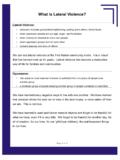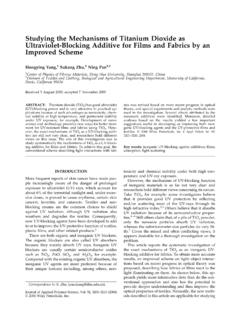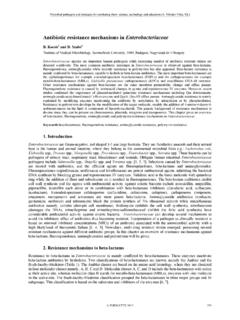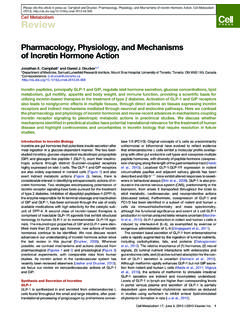Transcription of Coping Mechanisms - Equay-wuk
1 Page 1 of 2 Coping MechanismsCoping Mechanisms can also be described as survival skills . They arestrategies that people use in order to deal with stresses, pain, and naturalchanges that we experience in life. Coping Mechanisms are learned behavioural patterns used to cope. We learnfrom others ways to manage our stresses. There are negative copingmechanisms and positive Coping Mechanisms . Many people use their copingmechanisms to benefit them in a positive way. However, we are not always ableto cope with the difficulties that we experience a range of emotions throughout our lives, some good, some notso good. Our behaviours are usually a result of how we handle our emotions.
2 Ifwe are able handle our emotions positively, our behaviour will likely be positive. If we do not handle our emotions in a positive way, our behaviour will likely Responses To Situations: mental responses - (aggressive thoughts I can t do this I mworthless ) emotional responses - (fear, anger, sadness, fright) physical responses - (heart beats faster, stomach pain, headaches) behavioural responses - (drinking, overeating, isolating self, selfharm)It is important to be able to recognize our emotions before we can manage them. We can learn to become aware of our emotions, acknowledge what is happeningwithin ourselves, and to learn to think and plan before we 2 of 2 Coping Mechanisms continuedThere are a variety of Coping Mechanisms that we may use day to day.
3 If webecome aware of the negative Coping Mechanisms that we use (ways that domore harm than good), we can begin to learn and explore more positive ways tomanage our lives (ways that benefit our lives).Negative Coping MechanismsPositive Coping Mechanism violence and abuse (attacking physically,verbally, mentally, spiritually) acting out (misbehave on purpose) being passive (not trying to cope, always insituation where he/she is the victim) addictions (alcohol, drugs, solvents,medications, gambling, etc) minimizing (things are not that bad) rationalizing (he/she did not know better) denial (there is no problem) repression (forgetting) developing a false self (behaving likesomeone who you are not) disassociate self from situation (spacing out,thinking not feeling)
4 Controlling behaviour becoming a work-a-holic (stay busy to avoidfeeling) running away (physically, mentally,emotionally, spiritually) self harm, suicide attempts isolating self and withdrawal lying, blaming others (irresponsible) manipulating depression not communicating low expectations (of self and others) fantasizing (escape into a perfect world) being compulsive (too much of anything:eating, drinking, gambling) creating crisis overly helpful (helps others over self) grounding skills (stay focused, use all fivesenses) manage stress manage anger (deep breathing) get to know self seek support from friends and family communication (talk about our feelings) physical activity (healthy sexual relationships) healthy eating habits healthy sleeping habits hobbies (beadwork) and sports enjoying nature (walks, getting fresh air,connect with Mother Earth) seek out an Elders, spiritual leader learn patience respect others (their choices, we can notchange anybody)
5 Learn acceptance learn forgiveness crying, laughing, yelling in a safe place trust read, expand your knowledge be open-minded journal (write things down, doodle) chopping wood, fishing, get away spend quality time with family, partner positive self talk meditate, smudge, prayer setting goals cooking/baking/cleaning visit a mental health worker/communityworker delegate responsibility make time for self build or create something become involved in community events watch movies, listen to music play with pet visualize (imagine)








